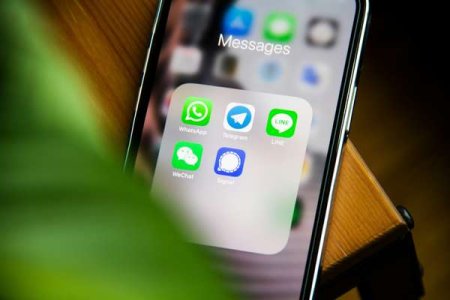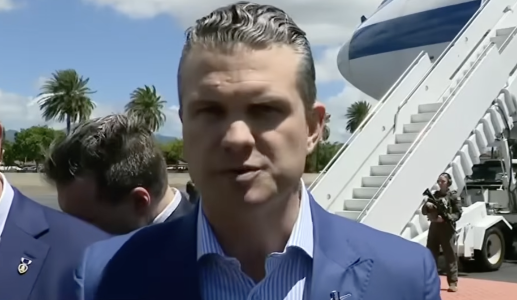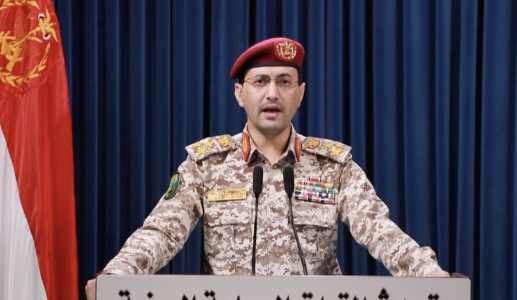Text trouble–Government officials' blunder sends top-secret plans to an unauthorized recipient via group chat
- Replies 0
A quiet breach at the highest levels of national security is raising serious questions about digital discretion and operational secrecy.
A small circle of former officials shared sensitive military plans in a secure group chat—one that included an unexpected participant.
What followed was a real-world strike, shocking Washington and beyond just hours after the messages were sent.
How did the leak happen? What was in the chat?
The Atlantic's editor-in-chief, Jeffrey Goldberg, found himself an unexpected participant in a group chat where he wasn’t supposed to be in.
Senior national security officials under former President Donald Trump—including his defense secretary—shared plans for upcoming military strikes in Yemen via a group chat on a secure messaging app.
The text chain, confirmed by the National Security Council as “appearing to be authentic,” laid out the US strategy against Iran-backed Houthi rebels, detailing targets, weaponry, and sequences of attack.
Goldberg reported that the leaked messages included "operational details" of US strikes against Iran-backed Houthi rebels, outlining specific targets, weapons to be used, and the sequence of the attack.

While it's unclear whether the content was formally classified, such information is typically kept secure for operational and personnel safety.
The leak came just before the US began a round of airstrikes in Yemen on March 15—starting roughly two hours after Goldberg received the messages.
The National Security Council (NSC) has confirmed it is investigating how a journalist's phone number ended up in a Signal group chat where top Trump-era officials were discussing sensitive matters.
The chat reportedly included Defense Secretary Pete Hegseth, Vice President JD Vance, Secretary of State Marco Rubio, and Director of National Intelligence Tulsi Gabbard. The Atlantic's Jeffrey Goldberg said he was added to the chat by Mike Waltz, Trump’s national security adviser.
In earlier news: A review: Executive Orders issued by Donald Trump in his first week
Did Trump know?
Responding to the controversy, Hegseth criticized Goldberg, calling him a “discredited so-called journalist” and accusing him of being “deceitful”, referencing past critical coverage from The Atlantic.
However, Hegseth did not explain why Signal was used for operational discussions or how Goldberg was included in the group, only stating, “Nobody was texting war plans and that’s all I have to say about that,” during remarks to reporters upon arriving in Hawaii.
Later that evening, White House Press Secretary Karoline Leavitt issued a statement affirming that President Trump still has full confidence in Waltz and the broader national security team.
When first asked earlier in the day, Trump denied knowledge of the incident, telling reporters, “I don’t know anything about it. You’re telling me about it for the first time,” and dismissed The Atlantic as “not much of a magazine.”
Source: @livenowfox / Youtube.
By that evening, he appeared to joke about the situation, sharing a satirical post from Elon Musk that mocked the incident with the headline: “4D Chess: Genius Trump Leaks War Plans to The Atlantic Where No One Will Ever See Them.”
Although Signal is widely used among government officials for its end-to-end encryption and enhanced security, it is not a classified platform, and experts note that while it is more secure than traditional SMS, it remains vulnerable to breaches.

The disclosure of sensitive military information occurred just as Defense Secretary Pete Hegseth’s office launched a new campaign to crack down on leaks, including the potential use of polygraph tests on defense personnel to determine how journalists have accessed classified material.
Sean Parnell, a spokesperson for Hegseth, declined to comment on why the defense secretary allegedly shared operational war plans via an unclassified messaging app.
Reactions from all sides
The administration’s handling of the situation quickly drew sharp criticism from Democratic lawmakers. Senate Majority Leader Chuck Schumer called for a full investigation, stating, “This is one of the most stunning breaches of military intelligence I have read about in a very, very long time.”
Sen. Jack Reed, the top Democrat on the Senate Armed Services Committee, called the situation “one of the most egregious failures of operational security and common sense I have ever seen.”
He warned that “American lives are on the line,” adding, “The carelessness shown by Trump’s Cabinet is stunning and dangerous. I will be seeking answers from the Administration immediately.”
Rep. Jim Himes, the ranking Democrat on the House Intelligence Committee, said he was “horrified” by the revelations.

“If a lower-ranking official did what is described here, they would likely lose their clearance and be subject to criminal investigation. The American people deserve answers,” Himes said, pledging to raise the issue in a scheduled committee hearing.
Even some Republicans expressed unease. Sen. Roger Wicker, the Republican chair of the Senate Armed Services Committee, remarked, “We’re very concerned about it and we’ll be looking into it on a bipartisan basis.”
Reed said he would coordinate with Wicker on how the committee would “follow up” on the leak.
Senate Majority Leader John Thune, a Republican from South Dakota, also called for clarity: “Obviously, we got to run it to the ground, figure out what went on there.”
Also read: What’s next for the US economy? A government official’s take on recession fears
However, House Speaker Mike Johnson took a more lenient stance, stating, “I think it would be a terrible mistake for there to be adverse consequences on any of the people that were involved in that call. They were trying to do a good job, the mission was accomplished with precision.”
The handling of national defense information is governed by strict laws under the Espionage Act, which makes it a crime to mishandle such material—even through gross negligence—by removing it from its “proper place of custody.”
The situation draws parallels to the Clinton email investigation, where the FBI reviewed whether former Secretary of State Hillary Clinton violated the law by discussing classified matters on a private email server. The FBI ultimately recommended against prosecution.
Signal–how often is it used?
Within the Biden administration, officials were allowed to use Signal on government-issued phones but were instructed to use it sparingly, according to a former Democratic national security official.
Source: ABC News / Youtube.
The app was mostly used to send brief alerts, or “tippers,” prompting someone to check classified communications while traveling. It was also occasionally used for scheduling sensitive meetings or classified calls, especially when officials were out of the office.
The source said the app’s use increased in Biden’s final year due to security threats from China and Iran targeting US government systems.
However, the official emphasized that they were unaware of top-level Biden officials, like Vice President Kamala Harris or Defense Secretary Lloyd Austin, ever using Signal to discuss sensitive operational plans, as alleged in the Trump administration’s case.
Among the harshest criticism came from Sen. Tammy Duckworth, an Iraq War veteran, who said on social media that Hegseth, “the most unqualified Secretary of Defense in history, is demonstrating his incompetence by literally leaking classified war plans in the group chat.”
You might be interested: Trump’s border wall 2029: The plan to secure the US southern border
Internal debate on Houthi strike
Messages from the chat revealed an internal debate over the timing and justification for strikes against Houthi forces.
Vice President JD Vance questioned whether Americans would understand the importance of the strikes, given the potential for a “moderate to severe spike in oil prices,” and whether the operation’s timing might be a “mistake.”
“I am willing to support the consensus of the team and keep these concerns to myself,” Vance wrote, adding, “But there is a strong argument for delaying this a month, doing the messaging work on why this matters, seeing where the economy is, etc.”
He also noted that Europe stood to benefit more than the US, writing, “If you think we should do it let’s go. I just hate bailing Europe out again.”
Source: CNN / Youtube.
Hegseth responded, “I fully share your loathing of European free-loading. It’s PATHETIC,” before concluding, “I think we should go.”
William Martin, Vance’s communications director, later sought to downplay the exchange, stating the vice president “unequivocally supports this administration’s foreign policy.”
Also read: Trump plans meeting with Putin–A step towards ending the war?

What are your thoughts on the administration's handling of national security? Have you ever witnessed a security breach of this magnitude? How do you think the administration should respond to ensure such a mistake is never repeated?
Share your thoughts on this incident in the comments below, but please remember to remain respectful.
A small circle of former officials shared sensitive military plans in a secure group chat—one that included an unexpected participant.
What followed was a real-world strike, shocking Washington and beyond just hours after the messages were sent.
How did the leak happen? What was in the chat?
The Atlantic's editor-in-chief, Jeffrey Goldberg, found himself an unexpected participant in a group chat where he wasn’t supposed to be in.
Senior national security officials under former President Donald Trump—including his defense secretary—shared plans for upcoming military strikes in Yemen via a group chat on a secure messaging app.
The text chain, confirmed by the National Security Council as “appearing to be authentic,” laid out the US strategy against Iran-backed Houthi rebels, detailing targets, weaponry, and sequences of attack.
Goldberg reported that the leaked messages included "operational details" of US strikes against Iran-backed Houthi rebels, outlining specific targets, weapons to be used, and the sequence of the attack.

Top Trump administration officials, including the Defense Secretary, were reported to have shared war plans in a group chat on Signal that mistakenly included a journalist. Image source: Adem Ay / Unsplash.
While it's unclear whether the content was formally classified, such information is typically kept secure for operational and personnel safety.
The leak came just before the US began a round of airstrikes in Yemen on March 15—starting roughly two hours after Goldberg received the messages.
The National Security Council (NSC) has confirmed it is investigating how a journalist's phone number ended up in a Signal group chat where top Trump-era officials were discussing sensitive matters.
The chat reportedly included Defense Secretary Pete Hegseth, Vice President JD Vance, Secretary of State Marco Rubio, and Director of National Intelligence Tulsi Gabbard. The Atlantic's Jeffrey Goldberg said he was added to the chat by Mike Waltz, Trump’s national security adviser.
In earlier news: A review: Executive Orders issued by Donald Trump in his first week
Did Trump know?
Responding to the controversy, Hegseth criticized Goldberg, calling him a “discredited so-called journalist” and accusing him of being “deceitful”, referencing past critical coverage from The Atlantic.
However, Hegseth did not explain why Signal was used for operational discussions or how Goldberg was included in the group, only stating, “Nobody was texting war plans and that’s all I have to say about that,” during remarks to reporters upon arriving in Hawaii.
Later that evening, White House Press Secretary Karoline Leavitt issued a statement affirming that President Trump still has full confidence in Waltz and the broader national security team.
When first asked earlier in the day, Trump denied knowledge of the incident, telling reporters, “I don’t know anything about it. You’re telling me about it for the first time,” and dismissed The Atlantic as “not much of a magazine.”
Source: @livenowfox / Youtube.
By that evening, he appeared to joke about the situation, sharing a satirical post from Elon Musk that mocked the incident with the headline: “4D Chess: Genius Trump Leaks War Plans to The Atlantic Where No One Will Ever See Them.”
Although Signal is widely used among government officials for its end-to-end encryption and enhanced security, it is not a classified platform, and experts note that while it is more secure than traditional SMS, it remains vulnerable to breaches.

Strategies against the Iran-backed Houthi rebels, detailing targets, weaponry, and sequences of attack were leaked. Image source: Firstpost / Youtube.
The disclosure of sensitive military information occurred just as Defense Secretary Pete Hegseth’s office launched a new campaign to crack down on leaks, including the potential use of polygraph tests on defense personnel to determine how journalists have accessed classified material.
Sean Parnell, a spokesperson for Hegseth, declined to comment on why the defense secretary allegedly shared operational war plans via an unclassified messaging app.
Reactions from all sides
The administration’s handling of the situation quickly drew sharp criticism from Democratic lawmakers. Senate Majority Leader Chuck Schumer called for a full investigation, stating, “This is one of the most stunning breaches of military intelligence I have read about in a very, very long time.”
Sen. Jack Reed, the top Democrat on the Senate Armed Services Committee, called the situation “one of the most egregious failures of operational security and common sense I have ever seen.”
He warned that “American lives are on the line,” adding, “The carelessness shown by Trump’s Cabinet is stunning and dangerous. I will be seeking answers from the Administration immediately.”
Rep. Jim Himes, the ranking Democrat on the House Intelligence Committee, said he was “horrified” by the revelations.

The National Security Council confirmed the authenticity of the text chain which contained operational details of military strikes against Houthi rebels in Yemen. Image source: LiveNOW from FOX / Youtube.
“If a lower-ranking official did what is described here, they would likely lose their clearance and be subject to criminal investigation. The American people deserve answers,” Himes said, pledging to raise the issue in a scheduled committee hearing.
Even some Republicans expressed unease. Sen. Roger Wicker, the Republican chair of the Senate Armed Services Committee, remarked, “We’re very concerned about it and we’ll be looking into it on a bipartisan basis.”
Reed said he would coordinate with Wicker on how the committee would “follow up” on the leak.
Senate Majority Leader John Thune, a Republican from South Dakota, also called for clarity: “Obviously, we got to run it to the ground, figure out what went on there.”
Also read: What’s next for the US economy? A government official’s take on recession fears
However, House Speaker Mike Johnson took a more lenient stance, stating, “I think it would be a terrible mistake for there to be adverse consequences on any of the people that were involved in that call. They were trying to do a good job, the mission was accomplished with precision.”
The handling of national defense information is governed by strict laws under the Espionage Act, which makes it a crime to mishandle such material—even through gross negligence—by removing it from its “proper place of custody.”
The situation draws parallels to the Clinton email investigation, where the FBI reviewed whether former Secretary of State Hillary Clinton violated the law by discussing classified matters on a private email server. The FBI ultimately recommended against prosecution.
Signal–how often is it used?
Within the Biden administration, officials were allowed to use Signal on government-issued phones but were instructed to use it sparingly, according to a former Democratic national security official.
Source: ABC News / Youtube.
The app was mostly used to send brief alerts, or “tippers,” prompting someone to check classified communications while traveling. It was also occasionally used for scheduling sensitive meetings or classified calls, especially when officials were out of the office.
The source said the app’s use increased in Biden’s final year due to security threats from China and Iran targeting US government systems.
However, the official emphasized that they were unaware of top-level Biden officials, like Vice President Kamala Harris or Defense Secretary Lloyd Austin, ever using Signal to discuss sensitive operational plans, as alleged in the Trump administration’s case.
Among the harshest criticism came from Sen. Tammy Duckworth, an Iraq War veteran, who said on social media that Hegseth, “the most unqualified Secretary of Defense in history, is demonstrating his incompetence by literally leaking classified war plans in the group chat.”
You might be interested: Trump’s border wall 2029: The plan to secure the US southern border
Internal debate on Houthi strike
Messages from the chat revealed an internal debate over the timing and justification for strikes against Houthi forces.
Vice President JD Vance questioned whether Americans would understand the importance of the strikes, given the potential for a “moderate to severe spike in oil prices,” and whether the operation’s timing might be a “mistake.”
“I am willing to support the consensus of the team and keep these concerns to myself,” Vance wrote, adding, “But there is a strong argument for delaying this a month, doing the messaging work on why this matters, seeing where the economy is, etc.”
He also noted that Europe stood to benefit more than the US, writing, “If you think we should do it let’s go. I just hate bailing Europe out again.”
Source: CNN / Youtube.
Hegseth responded, “I fully share your loathing of European free-loading. It’s PATHETIC,” before concluding, “I think we should go.”
William Martin, Vance’s communications director, later sought to downplay the exchange, stating the vice president “unequivocally supports this administration’s foreign policy.”
Also read: Trump plans meeting with Putin–A step towards ending the war?
Key Takeaways
- Top Trump administration officials, including the Defense Secretary, were reported to have shared war plans in a group chat on Signal that mistakenly included a journalist.
- The National Security Council confirmed the authenticity of the text chain which contained operational details of military strikes against Houthi rebels in Yemen.
- The information leak has led to strong reactions and calls for investigations from both Democratic and Republican lawmakers, citing concerns over operational security.
- The use of Signal for communicating sensitive information raises questions about security protocols and whether such practices were common or authorized in the Trump administration.
What are your thoughts on the administration's handling of national security? Have you ever witnessed a security breach of this magnitude? How do you think the administration should respond to ensure such a mistake is never repeated?
Share your thoughts on this incident in the comments below, but please remember to remain respectful.
Last edited:







